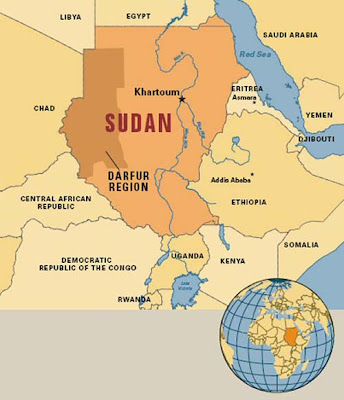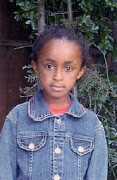Rape a way of life for Darfur's women Story Highlights
*Women and girls as young as four face rape on daily basis in Darfur
*U.N. mission says rape now biggest issue facing troubled Sudanese region
*Aid workers says 100 percent of women in camps face gender-based abuse
*Sudanese government says there is no rape in Darfur
This should not be. These women should not have to live their lives through this travesty. What did they do to deserve this? NOTHING. How do they feel because of these terrible acts? TERRIBLE. I bet it is hard for them to be normal, loving, wives, mothers, and friends because they have the cloud of shame from these things happening to them that they cannot even begin to control. They deserve so much better. And what else do these beautiful women have to deal with on a daily basis? VIOLENCE...HUNGAR...DISPLACEMENT...LOOTING...SHAME......FEAR
...ABANDONMENT...LONINESS...GUILT. These are things they should NEVER feel.
And what is the government doing? the institution set in place by God above (the only source of earthly power of any kind); whose purpose is to guide, protect, correct, and lead the people under it; what is the government of The Sudan doing to protect these beautiful women? NOTHING. They are completely denying any act of rape whatsoever. That is a travesty. Aid workers in the region, who are putting their own lives in absolute danger simply by being there are saying that rape is being used as a weapon of ethnic cleansing.
What is ethnic cleansing? Wikipedia states that it is carried out by way of deportation and genocide. At the most general level, however, ethnic cleansing can be understood as the expulsion of a population from a given territory...Ethnic cleansing is a well-defined policy of a particular group of persons to systematically eliminate another group from a given territory, often based on economic principles, or nationalist claims to the land. Such a policy often involves violence and is very often connected with military operations...Ethnic Cleansing is to be achieved by all possible means, from discrimination to extermination, and entails violations of human rights and international humanitarian law. The official United Nations definition of ethnic cleansing is "rendering an area ethnically homogeneous by using force or intimidation to remove from a given area persons of another ethnic or religious group"[4]
This war in the Sudan's Durfar region has proven devistating. It has also grown as conflict into Chad where many Durfar residents have emigrated to find peace, calmness, food, shelter, water and safty; 6 necessary ideas for these people that is more than very rarely found in Sudan. It has also proven to be long and unending for these beautiful African people for too long. The rebel forces and government-backed militias have been fighting for as long as many can even remember.
The conflict began in February of 2003 and is still ongoing today. Mainly a tribal and ethnic conflict, not religious like many in the past, there are 2 main visible sides to the conflict, although it is still more complicated than definable. On one side is the Sudanese Army and a militia group called the Janjaweed. The Janjaweed have recruted mosrly Arab Baggara tribes from the region of Rizeigat (a mostly Muslim group from northern Darfur of camel-hearding nomads); the people of Darfur, The Sudan, and Chad greatly fear the Janjaweed and what they will do to the innocence of the greater population. On the other side of the conflict is the rebel groups against the Janjaweed. These are comprised of the Sudan Liberation Moevement and the Justice Equality Movement. These are mostly comprised of the farming peoples of non-Arab ethnic groups, including the Fur, Zaghawa, and Massaleit peoples.
The Sudanese government, while claiming to be neutral in the conflict and not supporting the Janjaweed, provides money and assistance to the militia groups and participates in joint attacks on strategic tribes, who support the rebels. The onset of the conflict can be linked to dedesertification, drought, and overpopulation. The nomadic peoples, in search for water for their herds and people have moved onto lands previously left for the farming peoples.
The UN has released statistics on the conflict so far. It has estimated that at least 400,000 people have perished as a result of the conflict, through violence and disease. Other groups have estimated that 100,000 have died each month. Obviously, because of the extent of the conflict, the massive amounts of displaced peoples, and the lack of up to date technology, the numbers are hard to come up with very accurately. The Sudanese government has only claimed that 9,000 lives have been lost since the war began; this is a tragic underestimate. The shared statistic by most groups is that an estimated 2.5 million people have been displaced since 2006; this doesn't count those displaced by the conflict before that year.
The Sudanese government has tampered with evidence, by killing witnesses, cleaning up grave sites, and ridding the area of genocidal evidence; they also stop many journalists from entering the area, many are arrested for trying to enter the region. They also strongly object to the presence of UN peacekeepers, because they see them as foreign invaders.
And the US government has labeled the conflict as a genocide. What is a genocide? ...the deliberate and systematic destruction of an ethnic, racial, religious, or national group. In 1948, the United Nations Convention on the Prevention and Punishment of the Crime of Genocide presented this legal definition for genocide: any of the following acts committed with intent to destroy, in whole or in part, a national , ethical, racial, or religious group, as such: killing members of the group, causing serious bodily or mental harm members of the group, deliberately inflicting on the group conditions of life, calculated to bring about ist physical destruction in whole of in part, imposing measures intended to prevent births withing the group and forcibly transferring children of the group to another group.





No comments:
Post a Comment